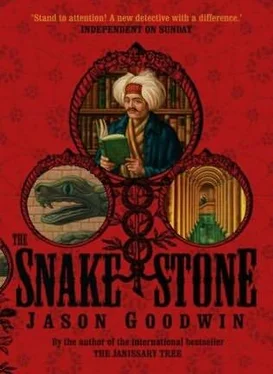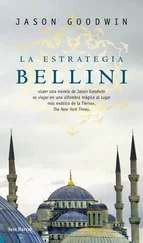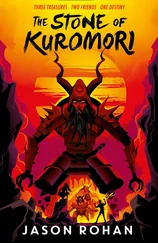Jason Goodwin - The snake stone
Здесь есть возможность читать онлайн «Jason Goodwin - The snake stone» весь текст электронной книги совершенно бесплатно (целиком полную версию без сокращений). В некоторых случаях можно слушать аудио, скачать через торрент в формате fb2 и присутствует краткое содержание. Жанр: Исторический детектив, на английском языке. Описание произведения, (предисловие) а так же отзывы посетителей доступны на портале библиотеки ЛибКат.
- Название:The snake stone
- Автор:
- Жанр:
- Год:неизвестен
- ISBN:нет данных
- Рейтинг книги:4 / 5. Голосов: 1
-
Избранное:Добавить в избранное
- Отзывы:
-
Ваша оценка:
- 80
- 1
- 2
- 3
- 4
- 5
The snake stone: краткое содержание, описание и аннотация
Предлагаем к чтению аннотацию, описание, краткое содержание или предисловие (зависит от того, что написал сам автор книги «The snake stone»). Если вы не нашли необходимую информацию о книге — напишите в комментариях, мы постараемся отыскать её.
The snake stone — читать онлайн бесплатно полную книгу (весь текст) целиком
Ниже представлен текст книги, разбитый по страницам. Система сохранения места последней прочитанной страницы, позволяет с удобством читать онлайн бесплатно книгу «The snake stone», без необходимости каждый раз заново искать на чём Вы остановились. Поставьте закладку, и сможете в любой момент перейти на страницу, на которой закончили чтение.
Интервал:
Закладка:
Yashim put his weight on the battens and eased himself into the hole in the roof. At the last moment, as he was trying to hold his position, he lost his grip and slithered roughly between the battens, falling several feet onto the floor below.
He stood up, rubbing his knee. He nudged a table and his fingers crawled over it until they encountered an oil lamp. Yashim picked it up and shook it gently. On a ledge by the door he found a box of matches, but the hiss of the match igniting frightened him, as though it identified his position: he swung round with the match above his head until it burned his fingers. He put the lamp on the table, removed the mantle, and struck another match to the wick. When the blue flame began to spread he dropped the mantle back and trimmed the wick. A dim glow illuminated the room.
He expected to see a couch at the back of the room: on his first visit, in the candlelight, it had been impossible to see the farther wall. Now he could see that another room, maybe a set of rooms, lay beyond a door in the far corner. It occurred to him that Baradossa might still be there asleep, in spite of his knocking; in spite of the noise he had made coming through the roof.
The book was lying on the table, exactly where it had been before. Yashim opened it with his free hand and flicked the pages until he found what he was looking for.
Xani. 600 piastres. There were five entries below, with dates, recording the monthly receipt of forty piastres. At the bottom, in red ink: 200 French francs: Paid In Full.
Yashim raised his head and listened. He heard voices overhead, and then-incongruously-the tramp of feet on stone; sounds from the courtyard were being filtered through the hole in the roof. A man spoke, close by. Someone knocked on the door; it sounded as if they were using the head of a stick.
Yashim listened intently. There were several voices outside, in the courtyard: anyone roused to look down over the balconies from one of the overhead apartments would see the light shining through the hole he’d made in the roof. Yet he felt a great reluctance to put out the lamp.
There was another possibility. He went over to the inner door and put his ear to it. There was no sound. He turned the handle slowly, pushed back the door, and stepped inside.
Baradossa was at home.
He was sitting bolt upright on the floor, arms raised in front of him, staring at Yashim. What had been his chest was nothing but a bloody mess. Yashim had seen many corpses in his time, but what unnerved him were the teeth. They seemed to be starting from his face, as if they had grown.
The lamp slipped through Yashim’s fingers. He clutched at it. The burning mantle scorched his hand and separated from the lamp, which shattered on the ground. With a sullen whump! the oil on the floor ignited. Yashim jumped back. The old moneylender leered at him from the floor.
Yashim raced to the front door and flung the bolts.
“Yangin-var!” he roared. “Fire! Fire!”
Yashim’s natural instincts were to help douse a fire, but not this time. A group of men outside started back in astonishment as Yashim barreled past. One, more quick-witted than the rest, made a lunge for his cloak; Yashim twitched it away and pelted for the street, not attempting to look round.
He ran without stopping until he reached the Fener, his own district. His heart was pounding.
The Jew had been killed that afternoon; no later. In rigor, Baradossa’s mutilated body had slowly stiffened, raising itself from the floor on which it lay; the tendons in the arms had pulled tight. Those artificial teeth had sprung open and slipped forward in the dead man’s mouth, a horrifying chaplet of wire and bone: the grin hadn’t been meant for him.
Whoever killed him had escaped the way Yashim had gone in: through the roof, leaving the door locked from the inside.
And a book on the table.
A book that demonstrated, beyond all doubt, that Xani had had a friend. Someone who had discharged his debt in good French silver. Two hundred francs.
Yashim’s thoughts turned to a Frenchman, now dead, whose wife was asleep in Widow Matalya’s apartment.
He went in quietly through the front door, into the silent house.
64
Yashim slept badly. In his dreams he saw Baradossa’s livid face, and the teeth protruding; then the dead man’s eyes turned dark and as the flames rose he saw it wasn’t Baradossa but the brazen serpent that was staring at him in all the terror of victory. And Lefevre was there, cramming his money into the serpent’s maw.
When he woke up, it was with a nagging doubt in his mind. He lit a lamp and took out Gyllius’s book, in French translation.
All other cities have their periods of government, he read, and are subject to the decays of time. Constantinople alone seems to claim a kind of immortality and will be a city as long as humanity shall live either to inhabit or rebuild it.
He turned the page. Gyllius described the layout of the city, and its walls, discussing Aya Sofia in detail, with reference to ancient sources. There were a few remarks about the Hippodrome and the Serpent Column: Yashim made a penciled note beside them, intending to check against Lefevre’s copy.
He could feel his concentration slipping. First someone had surreptitiously searched his flat, leaving nothing more than a few scattered grains of rice; next time they had smashed it apart. He thought of some of his books with a pang of anxiety. For Yashim regret was an emotion that held nothing but danger, and he had long ago succeeded in achieving a distance from it. But books were the glory of Ottoman art, and he had some he treasured. He flicked through Gyllius’s book, and opened it at random.
The Cistern remains. Through the inhabitants’ carelessness and contempt for everything that is curious it was never discovered, except by me, who was a stranger among them, after a long and diligent search for it. The whole area was built over, which made it less suspected that there was a cistern there. By chance I went into a house where there was a way down to it and went aboard a little skiff. I discovered it after the master of the house lit some torches and rowed me here and there across through the pillars…
He read the passage again, wondering what it could mean. Never discovered, except by me. Typical scholars. What of the man whose house stood over the cistern-had he not discovered it? With a skiff, no less! Yashim smiled to himself; scholars were all the same, at all times, in all lands.
He was very intent upon catching his fish, with which the Cistern abounds, and speared some of them by the light of the torches.
Yashim blinked. An underground lake, full of fish? He wondered how the fish would taste: pale, perhaps blind, their flesh would be insipid. More likely, Gyllius had simply made the whole thing up.
But the image stuck with him as he lay there in the dark, trying to sleep, of a man rowing under Istanbul in a little boat, spearing fish by torchlight.
65
Widow Matalya bobbed from foot to foot. She didn’t know what to suggest: the Frankish lady had woken up hours before, but whenever she looked in she said nothing, simply stared at her with sad eyes. Eventually Widow Matalya brought her something to eat, and a glass of tea.
The girl sat up in bed. “Chai,” she said shyly.
Widow Matalya nodded encouragingly. She pointed to the plates one by one. “Bread. Cheese. Olives. Eat up,” she added. “It’s good.” She patted her stomach. Then, quite unconsciously, she stroked the girl’s cheek. “I know how it is.”
The Frankish woman gave her a small smile. Widow Matalya sat down on the bed, encouraged.
“Even for me, it was a shock. We have them and then we lose them. Why should we be surprised? The men, always racing to and fro-one day they’re just little boys, and the next-well, they’re gone. But at least-” She checked herself, for once. At least they leave something behind, she had been going to say. But she couldn’t presume. She took the little white hand in hers and patted it. Then she picked up an olive and popped it into the girl’s mouth.
Читать дальшеИнтервал:
Закладка:
Похожие книги на «The snake stone»
Представляем Вашему вниманию похожие книги на «The snake stone» списком для выбора. Мы отобрали схожую по названию и смыслу литературу в надежде предоставить читателям больше вариантов отыскать новые, интересные, ещё непрочитанные произведения.
Обсуждение, отзывы о книге «The snake stone» и просто собственные мнения читателей. Оставьте ваши комментарии, напишите, что Вы думаете о произведении, его смысле или главных героях. Укажите что конкретно понравилось, а что нет, и почему Вы так считаете.












